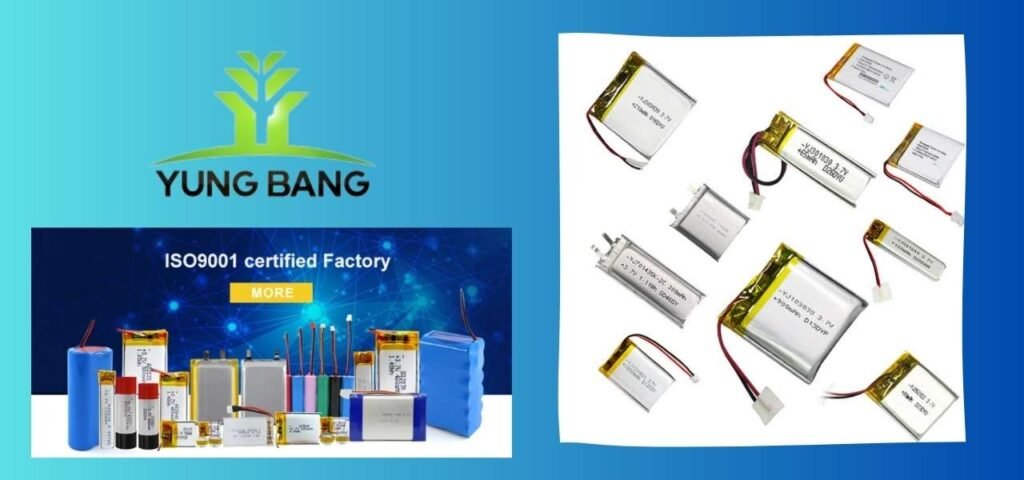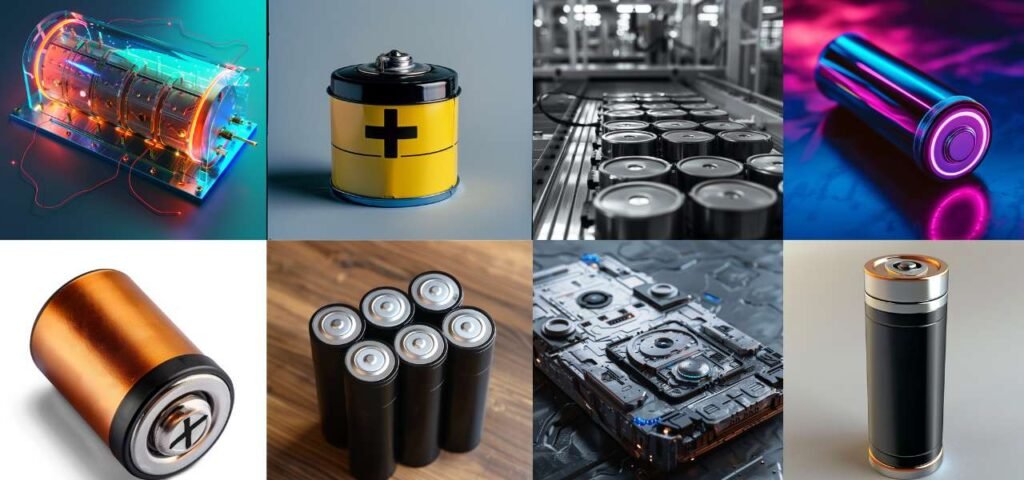Choosing the right battery technology is essential for many modern applications, from smartphones to electric vehicles. Two popular battery types today are Lithium Polymer (LiPo) and Lithium Ion (Li-ion) batteries. In this article, we will explore the key differences between li polymer battery vs lithium ion battery, addressing common questions to help you make an informed decision.

1. What Is the Difference Between Li Polymer Battery vs Lithium Ion Battery?
The fundamental difference between li polymer battery vs lithium ion battery lies in the electrolyte used. Lithium-ion (Li-ion) batteries use a liquid electrolyte, while Lithium Polymer (LiPo) batteries utilize a solid or gel-like electrolyte. This difference impacts how each battery performs and in which applications they excel.
- Lithium Ion Batteries: Li-ion batteries are widely used because of their high energy density, making them ideal for devices that require long-lasting power, such as smartphones, laptops, and electric vehicles. These batteries are typically encased in hard cylindrical or prismatic forms.
- Lithium Polymer Batteries: LiPo batteries, on the other hand, are more flexible in terms of shape and size. They are often found in drones, RC vehicles, and lightweight portable electronics. The gel-like electrolyte allows manufacturers to create thinner and lighter battery packs, which is crucial for devices where space and weight are limited.
In terms of energy density, Li-ion batteries tend to offer 150-200 Wh/kg, while LiPo batteries provide slightly less, around 100-150 Wh/kg. This means that for the same volume, Li-ion batteries can store more energy, making them preferable for applications that require extended battery life.
2. Which Battery Offers Better Safety: Lithium Polymer vs Ion?
Safety is a crucial factor when choosing between lithium polymer battery vs ion technologies. Both battery types have safety concerns, but the risks differ because of their construction and chemistry.
- Lithium Ion Batteries: Li-ion batteries are more prone to thermal runaway, which can lead to overheating, fire, or even explosion if the battery is damaged or improperly charged. This is partially due to the liquid electrolyte, which is flammable. However, modern Li-ion batteries come with Battery Management Systems (BMS) that monitor temperature, voltage, and current, reducing the risk of failure.
- Lithium Polymer Batteries: LiPo batteries are generally considered safer because they don’t use a flammable liquid electrolyte. However, they are more susceptible to swelling if overcharged or mishandled. The flexible nature of LiPo batteries makes them less durable under physical stress, which can lead to internal damage. Proper use of a charger for lithium polymer battery is necessary to prevent overcharging and to maintain safe operation.
In conclusion, both batteries require careful handling, but LiPo batteries are perceived to be somewhat safer in terms of chemical stability, provided they are not physically damaged or overcharged.
3. How Does Battery Performance Compare: Lithium Polymer Battery vs Lithium Ion?
When comparing lithium polymer battery vs lithium ion, performance metrics such as energy density, discharge rates, and lifespan must be considered.
- Energy Density: As mentioned earlier, Li-ion batteries typically have a higher energy density (150-200 Wh/kg) compared to LiPo batteries (100-150 Wh/kg). This makes Li-ion batteries a better choice for devices where battery life is a priority.
- Discharge Rates: LiPo batteries excel in applications requiring high discharge rates. They are often used in high-performance devices like drones and remote-controlled cars because they can release energy quickly without significant voltage drop. A 3s lithium polymer battery (with three cells in series, each at 3.7V nominal) can provide a total of 11.1V, which is ideal for high-demand gear.
- Lifespan: On average, Li-ion batteries offer a longer lifespan than LiPo batteries. Li-ion cells can last for 500-1000 charge cycles, whereas LiPo cells tend to last for 300-500 cycles. The actual lifespan will depend on usage patterns and how well the battery is maintained.
If you need a battery for a high-performance application requiring rapid energy delivery, LiPo batteries are a better option. However, for long-lasting energy storage with slower discharge rates, Li-ion batteries are superior.
4. How Do Charging Requirements Differ Between Li Polymer and Li Ion Batteries?
The charging protocols for li polymer battery vs lithium ion battery are different, and using the wrong charger can lead to battery damage or safety hazards.
- Lithium Ion Batteries: Li-ion batteries charge through a constant current/constant voltage (CC/CV) method, where the current is initially high and gradually drops as the battery reaches full charge. A typical Li-ion battery charges at 4.2V per cell, and it’s essential to use chargers designed specifically for Li-ion cells to prevent overcharging.
- Lithium Polymer Batteries: LiPo batteries also use the CC/CV method but are more sensitive to overcharging and require a specialized charger for lithium polymer battery. LiPo batteries have a more rigid voltage threshold for safety. Exceeding 4.2V per cell can lead to swelling or even fire, so it’s crucial to monitor the charging process carefully.
Both battery types need chargers with built-in safety features like voltage balancing and temperature monitoring to ensure safe and efficient charging.
5. What Are the Main Applications of 3S Lithium Polymer Battery?
A 3s lithium polymer battery is a common configuration in high-performance applications like drones, RC cars, and other electronic devices that require quick bursts of power. The “3s” refers to three LiPo cells connected in series, delivering a nominal voltage of 11.1V (3.7V per cell), with a fully charged voltage of 12.6V.
- Drones: Lightweight, high-capacity, and capable of providing high current discharge, LiPo batteries are ideal for drones that need to stay airborne for long periods while performing power-intensive tasks like video recording or aerial mapping.
- RC Cars and Aircraft: LiPo batteries are favored in these applications due to their ability to deliver high current quickly, which is essential for acceleration and maintaining high speeds.
- Portable Electronics: In some cases, 3s LiPo batteries can be used in custom-built portable electronics where high voltage and energy density are required in a compact form.
LiPo batteries’ flexibility in size and shape also makes them suitable for custom projects where space and weight are critical factors.
6. Which Is More Cost-Effective: Li Polymer Battery vs Lithium Ion?
When evaluating lithium polymer battery vs lithium ion in terms of cost, several factors come into play, including manufacturing complexity, energy density, and lifespan.
- Initial Cost: Generally, LiPo batteries tend to be more expensive due to the complexities involved in their design and production. Their flexible packaging and gel-like electrolyte increase manufacturing costs.
- Long-Term Cost: While Li-ion batteries may have a lower upfront cost, their higher energy density and longer lifespan can make them more cost-effective over time. Li-ion batteries typically last longer, meaning fewer replacements are needed, which can save money in the long run.
For high-performance industries like drones or RC vehicles, where weight and power delivery are critical, the higher cost of a LiPo battery may be justified. However, for most consumer electronics, Li-ion batteries offer a better balance of cost and performance.

7. How Do the Two Batteries Perform in Extreme Environments?
The operating temperature of batteries is a significant factor to consider when choosing between li polymer battery vs lithium ion battery.
- Lithium Ion Batteries: Li-ion batteries operate well in a temperature range of 0°C to 45°C for charging and -20°C to 60°C for discharging. However, high temperatures can degrade their lifespan quickly. When exposed to extreme cold, the performance of Li-ion batteries tends to diminish, leading to reduced power output.
- Lithium Polymer Batteries: LiPo batteries have similar operating temperatures but are more sensitive to environmental conditions. In cold temperatures, LiPo batteries can experience a reduction in capacity, while high temperatures can lead to swelling and potential safety hazards.
For outdoor or high-performance applications, where temperature fluctuations are common, both battery types should be equipped with a battery management system (BMS) to monitor and regulate charging and discharging.
8. How Do Guangdong Yungbang New Energy Co., Ltd. Support Custom Battery Solutions?
Guangdong Yungbang New Energy Co., Ltd. is a leading manufacturer specializing in both lithium polymer and 18650 battery packs. With extensive experience in the industry, the company provides customized battery solutions to meet the diverse needs of various industries, including consumer electronics, drones, and electric vehicles.
As the source factory for polymer lithium batteries and 18650 battery packs, Guangdong Yungbang New Energy offers high-quality products and exceptional service. Their batteries are designed to meet specific customer requirements, ensuring optimal performance, reliability, and safety. Whether you need a 3s lithium polymer battery for your drone or a custom battery pack for industrial applications, their team of experts can provide tailored solutions to fit your needs.
FAQ
1. What is the main difference between LiPo and Li-ion batteries?
LiPo batteries use a gel-like electrolyte and are more flexible in shape, while Li-ion batteries use a liquid electrolyte and offer higher energy density.
2. Which battery type lasts longer?
Li-ion batteries generally have a longer lifespan, with up to 1000 charge cycles, whereas LiPo batteries typically last between 300-500 cycles.
3. Are LiPo batteries more dangerous than Li-ion batteries?
Both batteries have safety concerns, but LiPo batteries are more prone to swelling if mishandled. Li-ion batteries may experience thermal runaway if damaged.
4. Can I use a LiPo charger for Li-ion batteries?
No, you should not use a charger for lithium polymer battery to charge Li-ion batteries, as the charging requirements for both are different.
5. What is a 3S LiPo battery?
A 3s lithium polymer battery consists of three LiPo cells in series, delivering a nominal voltage of 11.1V, commonly used in drones and RC vehicles.
By understanding the differences between li polymer battery vs lithium ion battery, you can make a more informed decision when choosing the right battery for your application.
